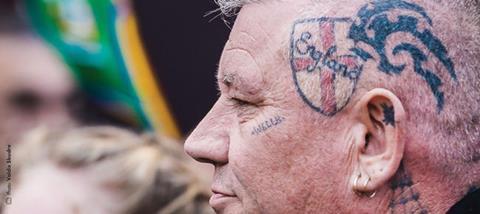
The problem is, not everyone looks at the world through this lens. Britain First’s posts and propaganda feed into the fears of many British people: concerns about immigration, fears about Islamic extremism and that hardto- pin-down-feeling that Britain’s historical identity is slowly being eroded. If these are things you worry about and a video pops up showing ‘British people’ (by which, Britain First tends to mean white people) getting attacked by Muslims, or read something telling you that money from all Halal food goes to fund terrorism, then you might just hit ‘Like’ and sign up for more of this content.
The fact is, we can’t just dismiss Britain First, or the English Defence League (EDL), or whoever the extreme flavour of the month is. Britain First has almost a million likes on Facebook (including three of my friends). When the group releases a new video, it’s normally watched by hundreds of thousands of people, and now, they’re heading off Facebook and onto the streets, holding marches and becoming a visible presence in an attempt to form a legitimate political party.
A recent BBC documentary, We want our country back, followed some of the group’s leaders as they filmed videos, incited trouble and reached out to people on the street. Many of those seen as sympathetic to the group’s cause were teenage boys; perhaps those who feel ostracised by wider society or, like many in their generations are struggling to find employment and see immigration as an easy blame for their problems. This sits alongside last year’s EDL Girls documentary, which focused on young women joining the English Defence League. In this show, 18-year-old Amanda called a night in the pub meeting fellow ‘League’ members, ‘Literally the best I’ve ever, ever had’. If this is what’s going on, the youth work community needs to sit up and take notice. The easy way out of this story would be to patronise and pity these naïve, daft young people, but there’s more to it than that. Yes, Amanda was undeniably naïve (‘Two weeks ago, I didn’t know what the EDL was, but I always thought Muslims were wrong… trying to bomb us’). Yes, she seemed to get her education from the most terrifying corners of the internet, and genuinely didn’t see a problem with a selfie of herself posing as Hitler on Facebook. But Amanda found hope, solace and community in the EDL ‘family’.

Do our youth ministries bang the drum for acceptance and inclusion?
It’s not new to suggest that young people are desperate to find a place to belong and a cause to believe in, but the idea that farright politics could service this purpose is, frankly, terrifying. Those in the EDL and Britain First are united by a sense of being let down by ‘their’ country, and brought together by a sense of indignity directed at the ruling powers. As society continues to ignore and disenfranchise young people, if teenagers find a place that accepts them and gives them an easy scapegoat for their anger, they’ll drift to the extremes of society. If wider society fails to give young people a voice and a hope, they’re going to find somewhere that does.
Here’s the thing: hate and intolerance breed in the shadows; they thrive on ignorance. If we don’t talk about racism or Islamophobia, we don’t give young people the tools to deconstruct and fight hate. If we don’t provide a better way, a wider model of love and acceptance, then we can’t act surprised when some young people slip into wider, dangerous cultural assumptions. Do our youth ministries bang the drum for acceptance and inclusion? Do we not only model that value, but explicitly talk about it? Youth work provides a key opportunity to show a better way, in a society that is, at times, divided and fractured.
But we have to be smarter and bigger than that. If the far right is offering a cause and a community, why isn’t the Church doing that? We have a story young people can be part of; we have a place they can call home. Let’s meet the needs and desires of young people that the EDL and Britain First are currently meeting. Nowhere in society is there a better place to fight hatred and inspire acceptance than the Church.
We’ve all seen images of far-right protestors meeting those who disagree. It descends into shouting: nobody changes their mind and no one comes out of it well. It’s a debate no one is going to win. Love isn’t going to triumph over hate by confronting it on the streets; it’s going to win by offering an alternative, by showing a better way, by modelling something better. The way to prevent young people buying into a far-right ideology isn’t by shouting louder, it’s by offering young people something better to be part of.




























